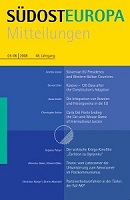Turkey's Vacillation between a Turkish-Arab and a Turkish-Kurdish Version of Ottomanism
Turkey's Vacillation between a Turkish-Arab and a Turkish-Kurdish Version of Ottomanism
Author(s): Günter SeufertSubject(s): Politics / Political Sciences, History, Social Sciences
Published by: Südosteuropa Gesellschaft e.V.
Keywords: Turkey;Ideology;Ottomanism;Turkish nation;Turkey's policy in Syria;PKK;Middle East
Summary/Abstract: 'Ottomanism' is defined in this contribution as an essentialist and exceptionalist reading of history and as the concurrent ideology in line with this reading. As a critique of modernity in general and of the modern nation state in particular, Ottomanism redesigned the identity of the Turkish nation and the understanding of its historical mission. Ottomanism proved to be of huge political significance for Turkey both in domestic and foreign policy realms. What is here called the “Turkish-Arab version of Ottomanism” turned out to be the underlying mental concept for Turkey's policy in Syria. Other than this version, the “Turkish-Kurdish version of Ottomanism” shows a more instrumental character. It was applied in the peace talks with the PKK. Both policies failed. But in the long run, Turkish-Kurdish cooperation is more likely to contribute to peaceful developments in the Middle East.
Journal: Südosteuropa Mitteilungen
- Issue Year: 2015
- Issue No: 03-04
- Page Range: 51-56
- Page Count: 6
- Language: English
- Content File-PDF

